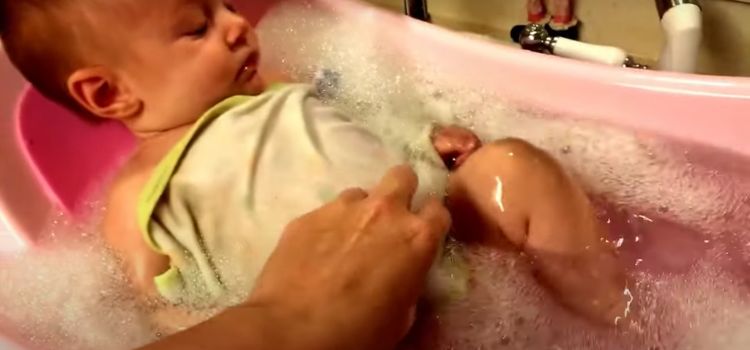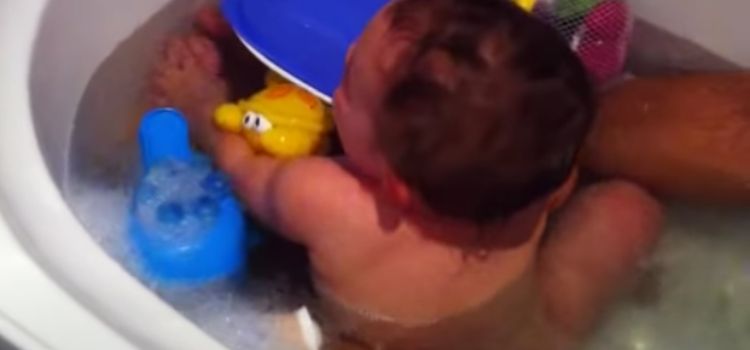As an Amazon Associate I earn from qualifying purchases.
Have you ever experienced a moment of distress when your child decided to spice up bath time by leaving an unexpected surprise? Dealing with unanticipated disasters is merely one of the numerous pleasures of parenting. In today’s blog post, we will discuss some helpful strategies for dealing with those inevitable moments when the baby makes bath time a bit dirtier than usual. So, if you’ve ever wondered, “What to do if baby poops in bath?” then continue reading to discover some tried-and-true tips and techniques for navigating this untidy situation.

Briefly explain the potential reasons why babies might poop in the bath.
There are numerous factors why infants may defecate in the bathtub. One possible explanation is that the tepid water can soothe their musculature, making gastrointestinal movements simpler. Babies may also feel more secure and comfortable in the water, which stimulates their digestion. In addition, some infants may be undergoing dietary changes or experimenting with new foods, which can impact their gastrointestinal movements. If your baby defecates in the bathtub, you must remain composed and remove them from the water immediately. Utilise gloves or a spatula to remove the excrement, then drain and disinfect the bathtub thoroughly. Always keep an eye on your baby during bath time to prevent accidents.
Remain Calm and Act Quickly:
Emphasize the importance of staying calm to ensure a safe and efficient response.
When unexpected events occur, such as the baby defecating in the bathtub, it is vital to maintain composure. To ensure a safe and effective response, it is vital to maintain composure and objectivity. By maintaining a serene demeanor, parents or carers are able to rapidly evaluate the situation, take the necessary steps, and provide the baby with the appropriate care. Reacting with distress or anxiety may impede the ability to respond effectively to the situation, placing the baby’s safety at risk. Therefore, maintaining composure is essential when dealing with unforeseen incidents such as a baby defecating in the bathtub, allowing for a swift and secure resolution.
Explain the need for immediate action to prevent any health or hygiene risks.
When a baby poops in the bath by accident, prompt action is required to prevent any potential health or sanitation hazards. It is crucial to act promptly to reduce the risk of contamination and ensure the baby’s health. To resolve this issue, follow these steps: First, remove the baby from the bath and position it on a clean, secure surface. Second, discharge the contaminated water and thoroughly disinfect the bathtub with a disinfectant. Next, sanitize the baby’s body with hypoallergenic wipes or clean fabric. Finally, guarantee proper hand hygiene by thoroughly cleansing your hands with detergent and water. You can effectively manage and prevent any potential health or sanitation risks associated with a baby defecating in the bathtub by taking immediate action and following these steps.
Remove the Baby from the Bath:
Provide step-by-step instructions on how to safely remove the baby from the contaminated water.
Follow these step-by-step instructions to securely remove a baby from contaminated water, such as when they have a gastrointestinal movement in the bathtub. First, remain tranquil and assure the baby’s safety. Support the baby’s head and neck while lifting it out of the water with both palms. Place them nearby on a clean towel or a changing mat. Use wet tissues or a moistened fabric to thoroughly sanitize the baby’s bottom and genital area. Eliminate all contaminated water and disinfect the bathtub. Finally, the baby should be dried and dressed in clean clothing. By adhering to these measures, you can ensure the baby’s cleanliness and protect against any potential infections.
Highlight the importance of handling the baby gently and keeping them warm throughout the process.
During various activities, it is crucial to emphasize the importance of managing the baby tenderly and making sure they remain comfortable. Taking a bath is a delicate procedure that requires the uttermost attention, so this is especially essential. Inadvertently, the baby may poops in the bath, which is another possibility for parents. In such situations, it is essential to maintain composure and act swiftly. Using the appropriate mittens or tools, remove the feces from the bathwater with care, and then disinfect the area thoroughly. Remember that sustaining a warm and compassionate environment for the baby will promote their comfort and well-being throughout these events cleans.
Drain and Clean the Bath:
Explain the steps to drain the bathwater, ensuring no poop particles remain.
To ensure that no feces particulates remain in the bathwater, it is essential to adhere to a few steps. First, promptly remove your baby from the bath and position them in a secure ring. Afterward, remove any visible feces from the water using a small ladle or strainer. Once the visible feces have been removed, the entire bath should be drained. Rinse the bathtub with hot water and a mild disinfectant after discharging to ensure proper sanitation. Finally, replenish the bathtub with clean water and proceed with the bathing routine for your baby. By following these steps, you can effectively address the situation if your baby poops in the bath, leaving the water free from any residual defecate particles.
Provide tips on how to clean and disinfect the bath thoroughly to prevent any further contamination.
To prevent further contamination and maintain a clean and sanitary bath, it is essential to know what to do if a baby poops in the tub. First, promptly remove the baby from the water and keep them out of the contaminated area. The stool should then be scooped out with a disposable glove or tissue and disposed of in the commode. Rinse the bathtub thoroughly with hot water to eliminate any remaining residue. Use a mild bleach solution or a baby-safe disinfectant to disinfect the bathtub after cleansing. Scrub the bathtub’s surface, including the sides and bottom, with a soft sponge or cloth. Rinse the bathtub again thoroughly to remove any remaining disinfectant. By following these methods, you can ensure that your baby’s next bath will be spotless and safe.
Clean the Baby:
Detail the process of cleaning the baby, focusing on effectively removing any fecal matter.
Cleaning a baby can be a delicate process, particularly when it comes to removing feces effectively. It is essential to know what to do if your baby has a gastrointestinal movement while bathing. First, remove the baby from the bath and position them on a clean towel. Using a spatula or a disposable glove, carefully remove any visible feces from the bathtub. Then, clear the bath and thoroughly sanitize it with a baby-safe detergent or disinfectant. After that, thoroughly cleanse the baby with tepid water, paying special attention to the nappy area. To ensure hygiene and comfort, massage the baby dry and place a clean nappy on him or her. Remember that maintaining hygiene during bath time is essential for the health of your baby.
Include instructions on using gentle and baby-friendly cleansing products.
It is essential to use delicate and baby-friendly cleaning products when bathing your infant. These products are designed to be gentle on your baby’s sensitive skin while effectively removing grime and impurities. To ensure a safe and pleasurable bathing experience, it’s essential to follow a few basic steps if your baby occurs to have a little accident in the bath. First, maintain your composure and remove your baby from the water immediately. Next, sanitize the afflicted area thoroughly with delicate swabs or a soft fabric. Then, using baby-safe cleaning products, thoroughly sanitize and disinfect the bathtub. These measures will help maintain a sanitary bathing environment for your child.
Observe for Any Health Concerns:
Discuss potential health risks associated with exposure to fecal matter.
Exposure to feces can potentially pose health hazards. When it comes to infants, it is not uncommon for them to defecate in the bathtub. This situation may raise hygiene and infection-related concerns. If this occurs, immediate action must be taken to mitigate any potential health hazards. Begin by removing the baby from the contaminated water and thoroughly disinfecting the bath. Ensure that the baby’s entire body is cleansed with tepid water and mild detergent. In addition, it is essential to watch out for any indicators of illness or distress in the baby and to seek medical care if necessary. Parents can mitigate the potential health risks associated with exposure to feces in the bath by taking prompt and effective action.
Encourage parents to monitor the baby for any symptoms or changes in behavior and seek medical advice if necessary.
Parents should always be on the lookout for any symptoms or behavioral changes in their baby. It is essential to pay strict attention to their health, particularly during bath time. In the unfortunate event that a baby poops in the bathtub, it is crucial for parents to act immediately. The baby should be gingerly removed from the bath, and thoroughly cleaned, and the bath area should be disinfected. If there are any concerns about the baby’s health or if they are in pain, it is strongly advised to seek medical attention. To ensure the baby’s health and prevent potential health complications, prompt action, and appropriate sanitation practices are essential.

Take Preventive Measures:
Offer practical suggestions to minimize the likelihood of baby pooping in the bath in the future.
To reduce the likelihood of a baby defecating in the bathtub in the future, there are a number of practical steps you can take. Establishing a regular lavatory routine for your baby will encourage them to defecate prior to bath time. Consider adjusting their feeding schedule to ensure that they have sufficient time to metabolize their food. It is also advisable to check their diapers before placing them in the bath, as a contaminated diaper could indicate the need for a diaper change. Finally, keep a close watch on your baby during bath time and be prepared to remove them from the water if they exhibit symptoms of needing to defecate. By employing these straightforward measures, you can help prevent accidents in the bathroom.
Discuss strategies such as adjusting feeding schedules, monitoring bowel movements, or using protective swim diapers.
When it comes to coping with a baby who poops in the bathtub, parents have a number of options. Adjusting feeding schedules can assist in regulating gastrointestinal movements and reduce the likelihood of incidents during bath time. Keeping a close eye on a baby’s bowel movements is also advantageous, as it enables parents to anticipate when their child may need to defecate. In addition, the use of protective swim diapers can add an additional layer of protection against any unforeseen catastrophes. Parents can effectively manage the circumstance if their baby poops in the bath by employing the aforementioned strategies.
Conclusion
In conclusion, when a baby poops in the bathtub, it is important to recollect a few critical measures. First, maintain your composure, as this will help create a calming environment for you and the baby. Second, act swiftly by removing the baby from the bath and evacuating the contaminated water. Thirdly, give importance to hygienic practices by meticulously cleansing the bathtub and its surroundings. Parents can effectively manage this situation and ensure the health and well-being of their baby by following these steps. Remember that knowledge and self-assurance are potent parenting tools, and with these guidelines, parents can manage any unforeseen circumstances with ease.
Amazon and the Amazon logo are trademarks of Amazon.com, Inc, or its affiliates.